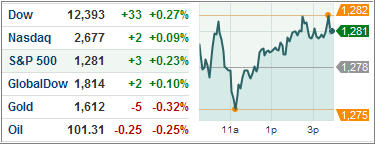Keeping in sync with the flatness towards the end of last week, markets didn’t move all that much as U.S. indices, Treasuries, and commodities minimally fluctuated. Volume remained relatively thin as the S&P 500 slightly edged up 0.22%.
Though markets are caught in a state of flux, the Euro remains weak against the dollar at $1.28/Euro, highlighting that Eurozone problems are still front and center.
Volatility has been down as of late, questioning whether it makes sense to gain some equity exposure. For those wishing to make some equity ETF additions, now might be an opportune time. If you do, keep your risk tolerance in mind and don’t forget that we’re still very much in bear territory when it comes to international ETFs.
As time is running out, Merkel and Sarkozy have now put the pressure on Greece to come to a deal with bondholders or forfeit bailout funds. Unable to agree on the debt restructuring, Greece is getting very close to the Eurozone exit door. Given this level of ineptitude, Greece might as well leave the Eurozone before it drags everyone else down.
And if there isn’t any other sign indicating that investors are afraid, Germany’s 6-month bond auction today resulted in a negative interest rate. This means that investors are actually willing to take a small loss just to keep their funds safeguarded. It’s certainly very worrying when a mattress yields a better return that government bonds.
Germany’s fortune slid further today as its November industrial production fell 0.6%. When the Eurozone’s beacon of hope is experiencing financial and economic strain, you can be fairly confident that other less exemplary Eurozone members will be hit even worse.
Not to mention, the Swiss National Bank chief had to resign today over his wife’s financial impropriety in currency markets, adding more insult to Europe’s injury. Financial Times Eurozone live blog offers a comprehensive daily run down of Eurozone developments such as this.
Meanwhile, China’s future hangs in the balance regarding its ability to institute financial reform. At China’s financial work conference, there was disappointment over a lack of progress in further developing bond markets or switching to a floating exchange rate currency regime. In other words, China might get stuck in a rut with diminishing growth if it can’t adapt to a fully capitalist system with minimal state interference.
As Alcoa kicks off earnings season tomorrow, it will be interesting to see how earnings reports match up against Eurozone concerns in impacting markets. Regardless, with the U.S. markets slightly up on the day and Europe bourse’s closing lower, I have to wonder how long this decoupling can stay with us.
Contact Ulli

Comments 3
Dear Ulli,
I’m not sure if my comment last week got through. I appreciate your blog greatly. I know that today you are saying that “for those wishing to make some equity ETF additions, now might be an opportune time.” I understand that international ETFs are still off the table, but the TTI for domestic equity crossed up over the trend line in October. But as I have followed your blog, you seemed to be saying we shouldn’t follow that signal but stay in cash and bonds. Was that interpretation right? Do you advise domestic equity exposure now? Do you have a rough percentage in mind for equities vs. cash and bonds? Or are you still avoiding the equity market?
Thanks so much for your blog, and in advance for answering my query.
Mel
Hello Mel,
I have always favored bonds and cash along with some selected sector funds. I use the HV ETF Cutline report to make my selections from those ETFs that have crossed their trend lines to the upside. There are more to choose from now than a few months ago. The amount of allocation depends strictly on your risk profile. Have I increased some of my equity holdings? Yes, I have added exposure.
Ulli…
Ulli, your response is most helpful and as always, most appreciated.
Thank you and best for the New Year,
Mel